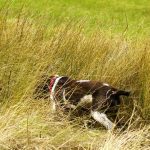Is It Safe For Dogs To Eat Mushrooms?
In this article Holidays4Dogs looks into the question of whether it is safe for a dog to eat mushrooms. The short answer is – yes – dogs can eat mushrooms – However, this only applies to the shop bought variety. Wild mushrooms are quite a different matter.
Mushrooms are not part of a dog’s natural diet and they don’t need to eat them. Many dogs in fact, don’t like the taste, or smell, of mushrooms and wouldn’t eat them anyway. However, you can rest assured that if your dog does eat shop-bought mushrooms, he is unlikely to come to any harm.
Wild mushrooms are definitely not for dogs.
However, when it comes to wild mushrooms it is always best to make sure your dog leaves them alone altogether. There are thousands of species of mushroom growing wild in the UK.
But, while many people in the know forage for wild mushrooms, it can be difficult even for experts to differentiate between edible mushrooms, and poisonous ones.
If you walk your dog where there are a lot of wild mushrooms growing it is always best to teach your dog to leave them alone. Some varieties can be just as toxic to dogs as they are to humans. If you have mushrooms growing in your garden, it’s important to remove them.
Some of the more common mushrooms which can be extremely poisonous if consumed are;
- Fly Algaric;
 (red capped mushrooms made iconic in fairy-tale depictions),
(red capped mushrooms made iconic in fairy-tale depictions), - Jewelled Death Cap; (a yellow capped mushrooms with raised white bumps),
- Death Cap; (Creamy white mushroom often mistaken to be edible, but can be deadly to people and animals, even if only a small amount is consumed),
- Autumn Galerina; ( often found growing out of rotten branches and trees and just as deadly as the death cap mushroom).
These are just a few of the more commonly seen mushrooms that should be completely avoided. The most toxic ones, including the aptly named Death Cap mushroom, can cause acute kidney and liver failure and ultimately death.
Others affect the nervous system causing seizures and an inability to walk. In other cases, wild mushrooms can cause stomach upset, vomiting and diarrhoea, but may not be life threatening.
Treatment for mushroom poisoning.
If you suspect your dog has eaten a wild mushroom take your dog to the vet immediately. If you can, take a sample of the mushroom which will help the vet to administer the best treatment as quickly as possible. Treatment will depend on the type of mushroom consumed. Common treatment may be to induce vomiting as soon as possible, but you must not attempt this at home – always take your dog to the vet. Fluid therapy may also be administered to encourage urination. This has the effect of flushing toxins from the kidneys.
Conclusion.
 While it is generally safe for dogs to eat shop-bought mushrooms, it might be best not to give them to your dog to eat. It just means, you needn’t worry if he eats mushroom you have dropped on the floor, while cooking. However, it is important to prevent your dog from eating wild mushrooms.
While it is generally safe for dogs to eat shop-bought mushrooms, it might be best not to give them to your dog to eat. It just means, you needn’t worry if he eats mushroom you have dropped on the floor, while cooking. However, it is important to prevent your dog from eating wild mushrooms.
If dogs do eat mushrooms – provided toxins are flushed from the body quickly, dogs usually recover well. That said, treatment can be extensive and expensive and in some cases, the dog may not recover.
Thankfully, dogs are not generally attracted to the taste, or smell, of mushrooms, but it’s still best to keep an eye on your dog when walking in areas where wild mushrooms grow. As interesting and as beautiful as wild mushrooms are, they are definitely for dogs – or people – to eat.
As an added warning – wild mushroom can be very dangerous to people too. Unless, you are an expert, it is wise never to eat mushrooms you find in the countryside.
For our Holidays4Dogs article on why dogs eat grass follow the link here.



